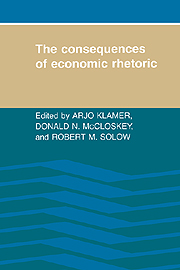Book contents
- Frontmatter
- Contents
- Preface
- The consequences of economic rhetoric
- PART I ECONOMIC RHETORIC: INTRODUCTION AND COMMENTS
- PART II ECONOMIC RHETORIC: FURTHER ARGUMENTS
- PART III ECONOMIC RHETORIC AMONG ECONOMISTS
- PART IV ECONOMIC RHETORIC IN POLITICS AND JOURNALISM
- PART V ECONOMIC RHETORIC: ITS RHETORIC AND ITS CONSEQUENCES
- 17 Negotiating a new conversation about economics
- 18 The consequences of rhetoric
- 1 Appendix: Other contributors and participants
- Index
17 - Negotiating a new conversation about economics
Published online by Cambridge University Press: 07 September 2010
- Frontmatter
- Contents
- Preface
- The consequences of economic rhetoric
- PART I ECONOMIC RHETORIC: INTRODUCTION AND COMMENTS
- PART II ECONOMIC RHETORIC: FURTHER ARGUMENTS
- PART III ECONOMIC RHETORIC AMONG ECONOMISTS
- PART IV ECONOMIC RHETORIC IN POLITICS AND JOURNALISM
- PART V ECONOMIC RHETORIC: ITS RHETORIC AND ITS CONSEQUENCES
- 17 Negotiating a new conversation about economics
- 18 The consequences of rhetoric
- 1 Appendix: Other contributors and participants
- Index
Summary
We all know that, with a few exceptions, conferences are serious activities and play a critical role in our intellectual lives. But we do not necessarily know what that role is. Consequently our defense against criticism and parody is weak.
During this particular conference several people mentioned to me David Lodge's Small World. It was easy to understand why: The book makes fun of the world of literary critics, the very same world in which we as economists are getting interested, and especially of its conferences. “The modern conference,” Lodge writes in the warm-up to his story, “resembles the modern pilgrimage of medieval Christendom in that it allows the participants to indulge themselves in all the pleasures and diversions of travel while appearing to be austerely bent on self-improvement.”
But David Lodge's Small World is fiction, its characters are literary (although rumors have it that Stanley Fish, who is the author of Chapter 3 in this book, stood model for Professor Zapp), and its descriptions of conferences are a caricature. Conferences are not as ludicrous as Lodge makes them out to be; not many will experience them as “long hours of compulsory sociability” and end up with “the familiar conference syndrome of bad breath, coated tongue, and persistent headache, that came from smoking, drinking and talking.”
- Type
- Chapter
- Information
- The Consequences of Economic Rhetoric , pp. 265 - 279Publisher: Cambridge University PressPrint publication year: 1989
- 3
- Cited by

